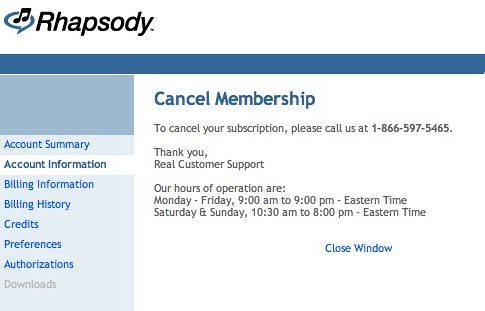I recently decided to cut back on media consumption and increase vegetable consumption in one swift move, by cancelling Netflix and Rhapsody subscriptions and joining a CSA (Community Supported Agriculture — basically a farm subscription). I was generally pretty happy with Netflix but didn’t cycle through DVDs frequently enough for it to be worth it. I thought that Rhapsody was basically OK, but had enough annoying bugs that I didn’t feel like it was worth keeping around.
Canceling Netflix was as easy as signing up for Netflix. The feedback mechanism was spot-on, as well; the cancellation page included a survey to provide feedback on why I was leaving, and the reasons listed were clear and well thought-out, as well as being actual weaknesses with the service. For example: “I am disappointed with the technical quality (i.e.the software doesn’t work on my computer or I am a Mac/Apple computer user) of the “Watch Instantly” feature of the service where I can watch movies and TV episodes instantly on my PC.” Even the closing message was kind and well-written: “From all of us at Netflix, thank you for your patronage and we hope to have you as a customer again in the future.”
End result: I did cancel the subscription, but I still have positive feelings about Netflix, and would be willing to re-subscribe in the future.
But then, Rhapsody. Sigh. I assumed I could cancel online. I was wrong.
I did call, and the office was closed. So I had to call back from work, which meant either bugging my office-mates or holing up in conference room. So imagine this scene — I’m sitting in a cavernous, echo-y conference room, calling the Rhapsody people, going through a phone tree, waiting on hold, and then finally getting connected to a human. And, not surprisingly, this was a very unhelpful person. I don’t think it was necessarily her fault — she had to work from a pretty bad script. For example, she asked me why I wanted to cancel, and I explained that the Rhapsody website is very slow, that my libraries and playlists kept disappearing, and that there were consistent problems with the sign in process.
Rhapsody employee: “So… the service is not interesting to you?”
Me: “No. The service is broken.”
She either had to make a selection from a limited number of items, or her English wasn’t up to understanding what I meant. Either way, this would be filed as a Bad Customer Experience. I wanted to give my feedback and they didn’t want it or didn’t have a way to get it.
And then I got an email from Rhapsody, with a link to fill out a survey. I didn’t have time to respond immediately, so had to wait a couple of days. I really did want to let them know about the technical problems I was having as I thought it could be useful to them.
Alas.
I know they’re lying when they say they value my “time and opinions,” since they 1. wasted my time and 2. clearly aren’t enormously interested in my opinions.
End result: I will never re-subscribe to Rhapsody and would dissuade anyone else from joining. I had been on the fence about it, but no longer.
Subscription services generally see a large percentage of their subscribers cancel and return. Why antagonize people who are canceling? They are a lot more likely to return as customers than the average web user. Making customers jump through hoops to cancel won’t keep them leaving, but it sure will keep them from wanting to come back.
Oh, and the vegetables we’ve been getting every week from Terra Firma Farm are amazing.


